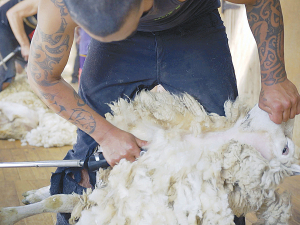Warm summer weather heightens the risk of flystrike.
However, there are steps farmers can take to make sheep as unattractive to flies as possible this summer.
Will Halliday, Beef + Lamb New Zealand’s senior advisor biosecurity and animal welfare, says the best and most effective approach to preventing flystrike is to use a combination of strategies also known as Integrated Pest Management (IPM).
He says IPM aims to keep pressure on the pest throughout its lifecycle by using a combination of chemical and non-chemical tools.
“It’s about attacking maggots and flies from different angles at different times.”
For example, weekly monitoring for the four blowfly species that cause flystrike (Australian green blowfly, European green blowfly, Brown blowfly and Hairy Maggot blowfly). Using small offal-baited fly-traps will detect when these flies are active which can then trigger a management response.
It could include shearing, crutching, dipping and/or moving sheep to higher ground with cooler temperatures and higher wind speed.
During high-risk periods, intensive grazing should be avoided if possible and hot-spots on the farm identified and avoided. These could include sheltered, scrubby gullies, patches of thistles, bush lines and the lee of shelter-belts.
Chemicals play an important role in the prevention and treatment of flystrike, over-reliance can lead to resistance.
It is important to only use chemicals known to be effective on individual farms and use different chemicals to treat an active flystrike lesion than those used for flystrike prevention.
Halliday adds that the Managing Flystrike and Lice publication put together by Beef + Lamb New Zealand, Merino NZ and Sheep and Beef Cattle Veterinarians explains the lifecycle of pests, helps decipher chemical product labels and applications.
“It is an excellent resource to help farmers put together a management plan for the prevention and treatment of both flystrike and lice.”
Preventing Flystrike
- Use offal-traps to monitor fly activity.
- In high-risk periods move sheep to higher, more exposed paddocks.
- Identi void farm hotspots (thistle patches, bush-lined paddocks, shelterbelts).
- Use different chemicals for the treatment of active flystrike lesions than those used for flystrike prevention.
- Understand the chemical options available and withholding periods.


















